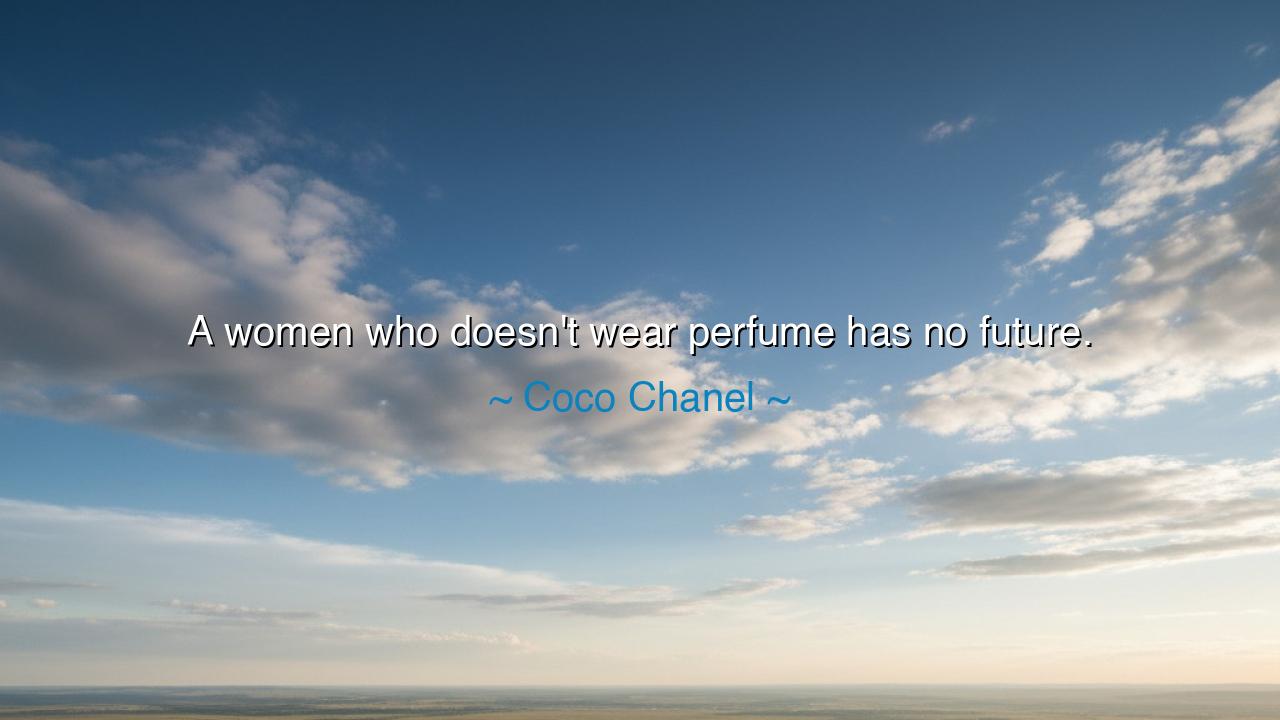
A women who doesn't wear perfume has no future.






"A woman who doesn't wear perfume has no future." These words, spoken by the iconic Coco Chanel, are more than a mere endorsement of fragrance; they are a declaration of presence, identity, and the invisible essence that defines a woman’s place in the world. Chanel, a figure of remarkable vision, understood that to exist in the world, to make an impact, is not merely a matter of physical presence but of something deeper, something ethereal—a woman's essence, something that fragrance encapsulates perfectly. A woman who does not wear perfume, according to Chanel, is one who is not ready to make her mark, one who does not understand the power of self-expression or the lasting impression that only the intangible can leave behind.
In ancient cultures, the importance of scent and perfume was no less significant. The Egyptians used perfumes and oils not merely for personal pleasure but as offerings to the gods, a way to transcend the mundane and touch the divine. The Romans too recognized the power of fragrance; emperors, senators, and the wealthy alike adorned themselves with exotic scents. These fragrances were seen not only as personal adornments but as symbols of power, elegance, and refinement. The ancient world understood that scent was an invisible language that spoke louder than appearance or words, evoking a powerful reaction from those who encountered it. In this way, Chanel’s assertion that a woman without perfume has no future is not a statement about vanity, but about the intrinsic value of a woman’s identity in a world that thrives on subtlety and impression.
Consider the great queens of history, such as Cleopatra, whose allure was as much about the perfumes she wore as it was about her intellect and beauty. Cleopatra was famous for using aromatic oils and fragrances, believed to have captivated Julius Caesar and Mark Antony, not just with her beauty, but with the mystique she cultivated through the scents she wore. Scent was a way for her to announce her presence, to command attention, and to ensure that her legacy was not just seen, but felt. To have a future, then, was not only to possess power and beauty, but to understand how to leave an indelible mark through the subtle and the invisible, as Chanel would later teach.
Perfume, as Chanel suggests, is not merely a tool for attraction or beauty; it is a mark of confidence and authenticity. In the same way that great warriors were often distinguished not only by their skill but by the aura they carried with them, so too does a woman distinguish herself by her fragrance. It is an extension of her essence, an invisible force that precedes her entrance and lingers long after she departs. When a woman wears perfume, she wears more than just a fragrance—she wears a narrative, a story about who she is, where she has been, and where she is going. The future, Chanel reminds us, is not about the external trappings we acquire but about how we express ourselves in the world, how we define our own identity and presence.
In the modern world, we often think of the future in terms of success, wealth, and power. But Chanel’s perspective is broader, more intimate. It speaks to the quiet forces that shape our identity—those things that are not bought or owned, but created through our choices. A woman who does not wear perfume, in this sense, is a woman who is not fully aware of the power of self-expression, a woman who is not fully attuned to the sensory world that surrounds her. She may have the trappings of success or wealth, but she lacks the ability to truly mark her presence on the world in a way that is as lasting as fragrance itself.
The lesson to be drawn from Chanel’s words is this: identity is not just something we project through the clothes we wear or the wealth we possess; it is about how we define ourselves in the world. To wear perfume is to embrace the power of the invisible, to recognize that the essence of who we are cannot always be seen, but it can be felt. A woman who understands this power does not just walk through the world—she imprints it. Perfume is not merely a scent; it is a declaration of presence, a signature that leaves a trace long after the body has gone.
Let us take action by embracing the subtle power of self-expression, by understanding that our essence cannot be defined solely by external standards, but by how we carry ourselves in the world. Like the ancient queens and heroes who knew the importance of fragrance in shaping their identity, we too must find those quiet ways to express our truth, to leave our mark on the world. So wear your perfume, not because it is expected, but because it is an extension of you, a symbol of your confidence and your authenticity. In doing so, you will craft a future that is not just seen, but felt, lasting far beyond the surface.






AAdministratorAdministrator
Welcome, honored guests. Please leave a comment, we will respond soon